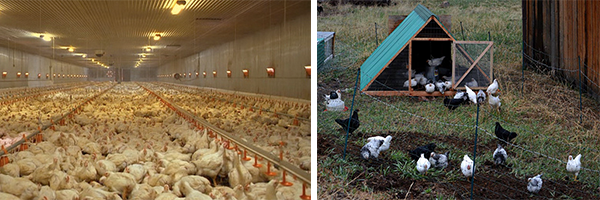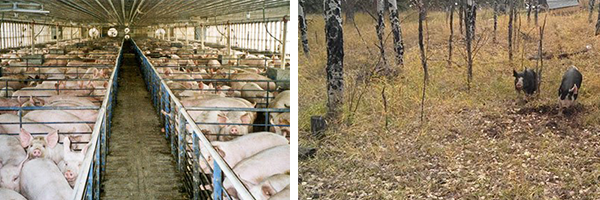Many people think that raising and slaughtering our own animals for meat sounds a bit macabre. This topic comes up a lot when we talk with friends, family, and acquaintances about what we’re doing. We hear “I could never do that!” or “Isn’t it hard to kill something cute?” a lot. Sometimes we’re even accused of being cruel or cold-hearted.
The truth is, neither of us do this because we like killing. In fact, we do it because we love animals.
If that sounds counter-intuitive, that’s okay. It’s taken us some time to come to grips with the concept too.
The Alternative
For years, both of us had been theoretically familiar with the horrors of factory farmed meat. We’d watched documentaries, read exposés, gone through the motions of disgust – but we continued to buy meat from the grocery store. Sometimes we’d feel guilty about it, but that would usually fade before we got home. It’s not hard to maintain a disconnect from the life of the animal you’re eating when meat comes wrapped prettily in styrofoam and plastic.
That disconnect is, in our opinion, precisely why there isn’t more of an uproar around how animals are raised industrially. No one wants to think about a cute, fluffy animal who died to provide the package of meat in their hands. When people do permit themselves the thought, often they imagine some fictional idyllic farm and hurry along to happier contemplations.
Though as an organization they’re not fully representative of our views, FarmSanctuary.org has a lot of useful information about factory farming. To illustrate how inaccurate the idyllic farm idea is, here are a couple side-by-side comparisons of factory farmed animals and photos from our homestead.


We think it’s pretty obvious that our animals live happier, healthier lives, and are treated with far more respect than their factory-raised counterparts. These photos of factory conditions don’t even come close to representing the worst that you might find in a factory farm setting.
Benefits
In the end, that’s why we raise animals for meat. We want to opt out of a system that treats animals as products without taking their well-being into account (beyond, perhaps, mortality rates). We also want to have a personal connection with the animals who live and die to feed us.
Aside from the animals’ well-being, a few of the other benefits we find in raising our own meat are that we:
- Have constant access to delicious, healthy meat of a quality totally unparalleled in a typical supermarket.
- Have greater control of and insight into how they’re fed and (almost never) medicated.
- Can usually save money on a per-pound basis, especially when compared with the retail cost of comparable products.
- Have learned a lot as cooks, in doing the butchering ourselves. We know where every cut we have comes from.
- Get daily enjoyment and fulfillment from caring for and interacting with our animals.
- Continually improve our land by making use of animal impact.
- Appreciate every meal (including those without meat) more than ever before.
Of course killing our animals is hard – if it ever stops being hard, we’re going to have to stop and re-evaluate what we’re doing. The flip side is that we know our animals have had the best lives we could give them, and died as comfortably as possible.
At this point we very seldom buy meat. We find that when we do, or when we eat meat outside our home, the appreciation of the animal’s life that applies to our home-raised meat extends to the more anonymous meat we encounter. We find that we eat less meat than we used to, and have more appreciation for the meat we do eat.
Why We Write About It
One of our goals with this blog is to make raising animals for meat less intimidating. Once people understand that we’re not cold-hearted murderers, we are often regaled with accounts of how tirelessly we must toil, caring for the livestock in addition to both working full-time jobs. In reality, there are very few days that having these animals feels like work. Besides processing pigs or a few other large, one-off tasks, at our scale it’s really mostly a matter of checking on their food and water, refilling as needed, and scratching a back or distributing food scraps. It’s more relaxation than effort, 90% of the time. Raising animals isn’t as hard as it’s made out to be.
We don’t have any illusions of being experts on the topics we write about, but we hope that by sharing what we’ve learned, we can encourage some people to think differently about their food and consider alternatives, whether that means raising their own or shopping differently.
